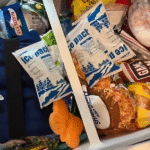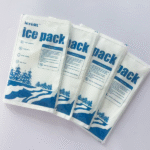Actualités logistiques de la chaîne du froid aujourd'hui: Principales tendances et perspectives pour 2025

Cold chain logistics is a critical part of industries like pharmaceuticals, distribution des aliments, and medical supply shipping. With the rapid advancements in technology and growing demand for efficient, reliable cold storage, the logistics landscape is evolving fast. Dans cet article, we will explore the most recent trends and developments in cold chain logistics for 2025. Que vous soyez dans le pharmaceutique, nourriture, or e-commerce industries, understanding these shifts can help you stay ahead.
What Are the Latest Trends in Cold Chain Logistics Today?
-
S'orienter 1: Advancements in Temperature Monitoring
-
S'orienter 2: The Role of AI in Optimizing Logistics
-
S'orienter 3: Sustainability and Eco-friendly Solutions
-
S'orienter 4: Blockchain and its Impact on Cold Chain Transparency
-
S'orienter 5: The Increasing Demand for Real-Time Data in Supply Chains
What Are the Key Developments in Temperature Monitoring for 2025?
Dans 2025, temperature monitoring continues to be a cornerstone of cold chain logistics. Advances in IoT sensors, combined with real-time tracking systems, now enable more precise control over temperature-sensitive goods. These innovations are making it easier than ever to ensure compliance with stringent regulatory requirements, particularly in sectors like pharmaceuticals and food.
Real-Time Temperature Control and Data Integration
Modern cold chain logistics now involves sophisticated data integration tools that connect temperature monitoring systems with warehouse management software, allowing for real-time visibility across the entire supply chain. The integration of these systems with AI-driven analytics ensures that any deviation from the set temperature thresholds is immediately flagged, minimizing the risk of spoilage or loss of goods.
Pourquoi c'est important pour votre entreprise
For industries that deal with perishable goods or sensitive medical products, the ability to monitor temperatures remotely and continuously has become a game-changer. By adopting these technologies, you can reduce the likelihood of mishandling or contamination, leading to fewer lost goods and better customer satisfaction.
| Systèmes de surveillance de la température | Avantages | Impact sur les entreprises |
|---|---|---|
| IoT-enabled Sensors | Real-time alerts | Enhanced security and reduced waste |
| AI-driven Analytics | Predictive adjustments | Optimized resource allocation |
| Integrated Systems | Seamless data flow | Improved operational efficiency |
How AI and Automation Are Shaping Cold Chain Logistics?
Intelligence artificielle (IA) is transforming the cold chain logistics sector. With the ability to analyze vast amounts of data and predict future trends, AI helps companies optimize routes, prévision de la demande, et rationaliser les opérations. Automation in cold storage facilities has also reduced human error, leading to more efficient management of inventories and product handling.
The Role of Autonomous Vehicles in Cold Chain
Dans 2025, autonomous vehicles are gaining traction in cold chain logistics. These self-driving trucks equipped with refrigeration systems ensure that goods are transported efficiently, reducing delays and carbon emissions. This technology is especially useful for long-haul deliveries, where maintaining a consistent temperature is crucial for ensuring the safety of products.
How You Can Benefit
By implementing AI and automation tools, you can significantly reduce operational costs, improve delivery times, and enhance the accuracy of your inventory management. This leads to fewer stock-outs and ensures that customers receive their goods at the optimal temperature.
What Impact Does Sustainability Have on Cold Chain Logistics?
La durabilité est une préoccupation croissante dans le secteur de la logistique, and cold chain logistics is no exception. As environmental regulations tighten and consumers demand eco-friendly practices, cold chain providers are investing in energy-efficient technologies and alternative refrigeration methods to reduce their carbon footprints.
Eco-friendly Refrigeration Technologies
One of the most significant innovations in sustainable cold chain logistics is the shift from traditional refrigerants to more eco-friendly alternatives. Companies are now adopting natural refrigerants like CO2 and ammonia, which have a much lower global warming potential (PRP) than conventional refrigerants. En plus, solar-powered cold storage solutions are becoming more prevalent, particularly in regions with abundant sunlight.
How This Helps Your Bottom Line
Sustainability initiatives not only help you meet regulatory standards but also resonate with environmentally conscious consumers. By adopting green technologies, your company can reduce energy costs, enhance its brand image, and attract a broader customer base that values sustainability.
| Pratiques durables | Avantages | Impact sur les entreprises |
|---|---|---|
| Réfrigérants écologiques | PRP inférieur | Regulatory compliance and cost savings |
| Solar-powered Cold Storage | Consommation d’énergie réduite | Improved brand image and customer loyalty |
Why Blockchain Technology is a Game-Changer for Cold Chain Transparency?
Blockchain technology is becoming increasingly important in cold chain logistics for its ability to provide full transparency and traceability. By creating an immutable, decentralized record of all transactions, blockchain ensures that every step of the cold chain process is tracked, from the moment goods leave the manufacturer to when they reach the final customer.
Enhancing Security and Reducing Fraud
Blockchain’s ability to store transparent and tamper-proof records has a major impact on reducing fraud and theft. For industries like pharmaceuticals, where counterfeiting is a major issue, blockchain provides an additional layer of security by confirming that products have not been tampered with at any point in the supply chain.
Pourquoi c'est important pour votre entreprise
Avec la blockchain, you can ensure the authenticity of your products, reduce the risk of fraud, and improve trust with your customers. It also helps in meeting regulatory standards by providing verifiable proof of compliance.
How Real-Time Data is Revolutionizing Cold Chain Management?
Dans 2025, real-time data is a game-changer in cold chain logistics. The ability to gather and analyze data in real time allows businesses to make informed decisions, optimiser leurs chaînes d'approvisionnement, and react to issues before they escalate.
The Rise of Smart Warehouses
Smart warehouses equipped with IoT sensors can monitor temperature, humidité, and other conditions continuously. This data is analyzed in real-time and can automatically trigger actions such as adjusting refrigeration settings or notifying warehouse managers of potential issues.
Benefits for Your Supply Chain
By leveraging real-time data, you can improve decision-making, réduire les retards, and enhance the overall efficiency of your cold chain operations. The ability to predict issues before they happen allows you to act proactively rather than reactively, saving both time and money.
What Are the Future Trends for Cold Chain Logistics?
2025 is set to be a transformative year for cold chain logistics. With rapid advancements in technology, increased focus on sustainability, and growing consumer expectations, the industry is poised to undergo significant changes. The following trends will shape the future of cold chain logistics:
-
Integration of AI with IoT for Smarter Operations
-
Increased Use of Renewable Energy in Cold Storage
-
Adoption of 5G for Real-Time Data Transmission
-
Focus on Global Expansion of Cold Chain Networks
Latest Developments in the Cold Chain Sector
-
AI-Enhanced Delivery Routes: More companies are using AI to optimize delivery routes, reducing fuel consumption and improving efficiency.
-
Focus sur la durabilité: Companies are increasingly adopting solar-powered cold storage and energy-efficient refrigeration systems.
-
Increased Use of Blockchain for Transparency: Blockchain is becoming more widespread for ensuring traceability and reducing fraud in sensitive shipments like vaccines and pharmaceuticals.
Questions fréquemment posées (FAQ)
What is the role of blockchain in cold chain logistics?
Blockchain ensures full transparency and traceability, helping to prevent fraud, counterfeiting, and ensuring compliance with regulations.
How does real-time data improve cold chain logistics?
Real-time data allows businesses to monitor conditions, react to issues before they escalate, and optimize supply chain efficiency.
Conclusion et informations exploitables
2025 is a critical year for cold chain logistics, with major technological advancements and a growing emphasis on sustainability and transparency. Alors que l'industrie continue d'évoluer, staying informed and adapting to these trends will be essential for maintaining a competitive edge. Embrace smart technologies, invest in eco-friendly solutions, and leverage real-time data to optimize your operations.
Étapes suivantes:
-
Adopt AI-driven logistics tools to streamline operations.
-
Explore sustainability solutions like solar-powered cold storage.
-
Implement real-time data systems to enhance decision-making.























